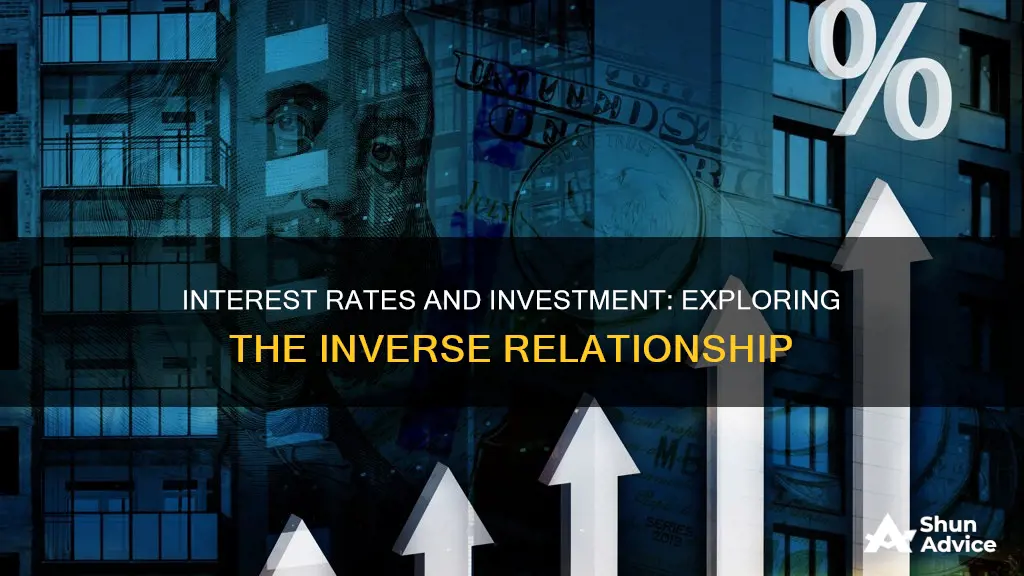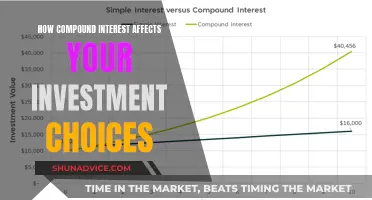
Changes in interest rates can have a significant impact on the performance of investments. When interest rates rise, the cost of borrowing for real estate investors increases, making it more expensive to invest in properties or take out mortgages. This can lead to a decline in demand for real estate, resulting in lower property prices and rental income. However, this impact can vary depending on the type of real estate investment. For example, commercial real estate may not be as affected by rising interest rates as residential properties due to longer lease terms and higher rental income potential. Additionally, investors locked in long-term fixed-rate mortgages will not be impacted by rising interest rates, providing them with stability in their investments.
| Characteristics | Values |
|---|---|
| Effect on consumers | Consumers are encouraged to borrow and spend more when interest rates are lower, stimulating the economy |
| Effect on businesses | Businesses may hold back on expanding or investing when interest rates are high as it becomes more expensive to borrow money for growth |
| Effect on real estate investors | The cost of borrowing for real estate investors increases, making it more expensive to invest in properties or take out mortgages |
| Effect on property prices and rental income | A decline in demand for real estate can result in lower property prices and rental income |
| Effect on investors with long-term fixed-rate mortgages | Investors locked in long-term fixed-rate mortgages are not impacted by rising interest rates, providing them with stability in their investments |
| Effect on cash investments | Cash investments such as savings accounts and certificates of deposit (CDs) may increase their yield, making them more attractive to investors seeking short-term stability and income |
| Effect on inflation | Higher interest rates may not keep up with the rising cost of goods and services, resulting in a loss of purchasing power over time |
| Effect on the financial industry | Banks, brokerages, mortgage companies, and insurance companies' earnings often increase as interest rates move higher because they can charge more for lending money |
| Effect on stocks | Some stocks will do better than others as interest rates increase. Consumer staples like soap and cereal will still sell pretty much as usual, while luxury cars may not |
| Effect on bond prices | There is an inverse relationship between bond prices and interest rates, meaning that as interest rates rise, bond prices fall, and as interest rates fall, bond prices rise |
What You'll Learn

The impact of rising interest rates on real estate investment
When interest rates rise, the cost of borrowing for real estate investors also increases, making it more expensive to invest in properties or take out mortgages. This can lead to a decline in demand for real estate, resulting in lower property prices and rental income. However, the impact can vary depending on the type of real estate investment. For example, commercial real estate may not be as affected by rising interest rates as residential properties due to longer lease terms and higher rental income potential. Additionally, investors locked into long-term fixed-rate mortgages will not be impacted by rising interest rates, providing them with stability in their investments.
Rising interest rates can also make it more expensive for businesses to borrow money for growth and expansion, which may cause them to hold back on investing. This can further reduce demand for commercial real estate, particularly if businesses are looking to cut costs by downsizing or moving to less expensive locations.
On the other hand, some sectors, such as the financial industry, tend to benefit from interest rate hikes. Banks, brokerages, mortgage companies, and insurance companies' earnings often increase as interest rates move higher because they can charge more for lending money.
Investing in cash may also seem like a safer option during periods of rising interest rates as it does not carry the same risks as other investments. Cash investments, such as savings accounts and certificates of deposit (CDs), may offer higher yields, making them more attractive to investors seeking short-term stability and income. However, it is important to consider the impact of high inflation on cash investments, as higher interest rates may not keep up with the rising cost of goods and services.
Monthly Interest Payments: Do Investments Reap Benefits?
You may want to see also

The effect of interest rates on the financial industry
Interest rates can have a significant impact on the performance of various investments. When interest rates rise, the cost of borrowing for real estate investors increases, making it more expensive to invest in properties or take out mortgages. This can lead to a decline in demand for real estate, resulting in lower property prices and rental income. However, this impact can vary depending on the type of real estate investment. For example, commercial real estate may not be as affected by rising interest rates as residential properties due to longer lease terms and higher rental income potential.
Similarly, businesses may hold back on expanding or investing when interest rates are high, as it becomes costly to borrow money for growth. When interest rates rise, it does not necessarily mean that all investments will be negatively impacted. The effects can differ depending on the type of investment and other factors, such as inflation and economic conditions. For instance, investing in cash may seem like a safe option during periods of rising interest rates as it does not carry the same risks as other investments. However, with higher interest rates, cash investments such as savings accounts and certificates of deposit (CDs) may also increase their yield, making them more attractive to investors seeking short-term stability and income.
Some sectors benefit from interest rate hikes. Banks, brokerages, mortgage companies, and insurance companies' earnings often increase as interest rates move higher because they can charge more for lending money. Certain stocks will also do better than others as interest rates increase. Consumer staples like soap and cereal will still sell pretty much as usual. Interest rates also affect bond prices. There is an inverse relationship between bond prices and interest rates, meaning that as interest rates rise, bond prices fall, and as interest rates fall, bond prices rise.
Deducting Investment Interest: Schedule A Expenses Explained
You may want to see also

How rising interest rates affect cash investments
When interest rates rise, the cost of borrowing for investors increases, making it more expensive to invest in properties or take out mortgages. This can lead to a decline in demand for real estate, resulting in lower property prices and rental income. However, this impact can vary depending on the type of real estate investment. For example, commercial real estate may not be as affected by rising interest rates as residential properties due to longer lease terms and higher rental income potential. Additionally, investors locked in long-term fixed-rate mortgages will not be impacted by rising interest rates, providing them with stability in their investments.
Rising interest rates can also affect cash investments such as savings accounts and certificates of deposit (CDs). With higher interest rates, these investments may increase their yield, making them more attractive to investors seeking short-term stability and income. However, it is important to consider the impact of high inflation on cash investments, as higher interest rates may not keep up with the rising cost of goods and services. For example, if inflation is at 3%, but your credit card debt account only offers a 2% return, you are essentially losing purchasing power over time.
Some sectors benefit from interest rate hikes, such as the financial industry. Banks, brokerages, mortgage companies, and insurance companies' earnings often increase as interest rates move higher because they can charge more for lending money.
Overall, the impact of rising interest rates on investments can vary depending on the type of investment, inflation, and economic conditions. While some investments may be negatively affected by higher interest rates, others may benefit from the increased yield and stability they offer.
Interest Rates and Foreign Investment: A Complex Relationship
You may want to see also

The relationship between interest rates and inflation
Interest rates and inflation are closely linked, with changes in interest rates having a significant impact on the performance of various investments. When interest rates rise, the cost of borrowing money increases, which can make it more expensive for businesses and individuals to invest in properties, take out mortgages, or expand their operations. This can lead to a decline in demand for real estate, resulting in lower property prices and rental income. However, the impact of rising interest rates on investments can vary depending on the type of investment and other factors, such as inflation and economic conditions.
For example, commercial real estate may not be as affected by rising interest rates as residential properties due to longer lease terms and higher rental income potential. Additionally, investors locked into long-term fixed-rate mortgages may not be impacted by rising interest rates, providing them with stability in their investments. On the other hand, when interest rates are lower, consumers are encouraged to borrow and spend more, stimulating the economy. This can lead to increased investment in other areas, such as stocks or businesses.
Some sectors, such as the financial industry, tend to benefit from interest rate hikes. Banks, brokerages, mortgage companies, and insurance companies' earnings often increase as interest rates rise because they can charge more for lending money. Certain stocks may also perform better when interest rates are higher, particularly consumer staples like soap and cereal, as these goods are still in demand regardless of interest rates.
It is important to consider the impact of high inflation on cash investments. While investing in cash may seem like a safe option during periods of rising interest rates, higher inflation may erode the returns on these investments over time. For example, if inflation is outpacing the interest earned on a savings account, the purchasing power of that savings account is effectively decreasing.
Savings Accounts: Lower Interest Rates than Investments?
You may want to see also

The impact of interest rates on consumer spending
Interest rates have a significant impact on consumer spending. When interest rates are low, consumers are encouraged to borrow and spend more, stimulating the economy. However, when interest rates rise, consumers may find themselves with less disposable income to spend on non-essential items. This is because the cost of borrowing increases, and monthly payments on mortgages and other loans increase, leaving consumers with less money to spend on other things.
The impact of rising interest rates on consumer spending can vary depending on the type of spending. For example, consumer staples like soap and cereal will still sell pretty much as usual, while luxury items like cars may see a decline in sales as consumers become more cautious about their spending.
The financial industry, including banks, brokerages, mortgage companies, and insurance companies, can benefit from rising interest rates as they can charge more for lending money. This can lead to increased earnings for these companies.
Additionally, investors may be attracted to cash investments such as savings accounts and certificates of deposit (CDs) during periods of rising interest rates as they offer short-term stability and income. However, it is important to consider the impact of high inflation on these investments, as the rising cost of goods and services may outweigh the returns on these investments.
Overall, rising interest rates can have a mixed impact on consumer spending, with some sectors and industries being affected more than others. While some consumers may spend less due to increased borrowing costs, others may be attracted to investments that offer stability and income in a volatile market.
Investments: Compounding Interest Options for Your Money
You may want to see also
Frequently asked questions
Not necessarily. When interest rates are high, consumers are less likely to borrow and spend money, which can negatively impact investments. However, some sectors, such as the financial industry, benefit from interest rate hikes as they can charge more for lending money.
An increase in interest rates makes it more expensive to invest in properties or take out mortgages, which can lead to a decline in demand for real estate and lower property prices. However, this impact can vary depending on the type of real estate investment. For example, commercial real estate may not be as affected by rising interest rates due to longer lease terms and higher rental income potential.
Cash investments, such as savings accounts and certificates of deposit (CDs), may increase in yield when interest rates rise, making them more attractive to investors seeking short-term stability and income. However, it's important to consider the impact of high inflation on cash investments, as the returns may not keep up with the rising cost of goods and services.







